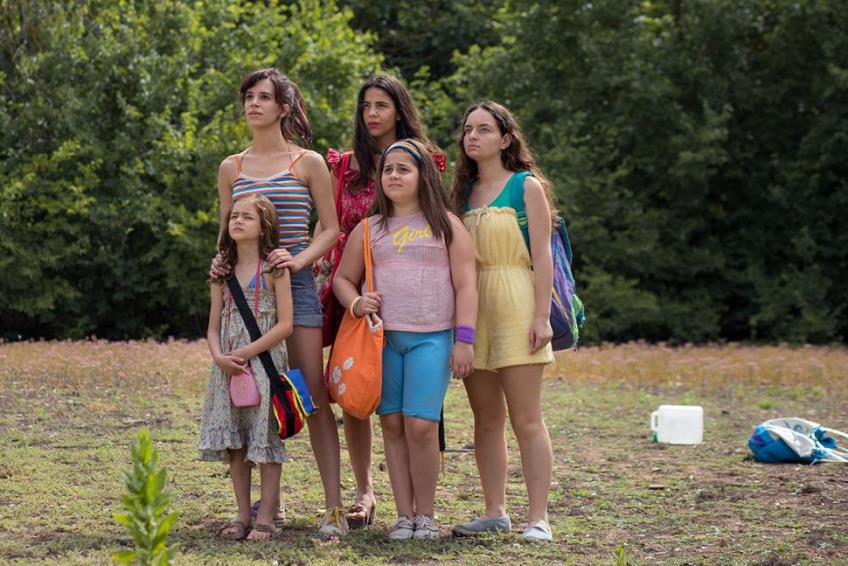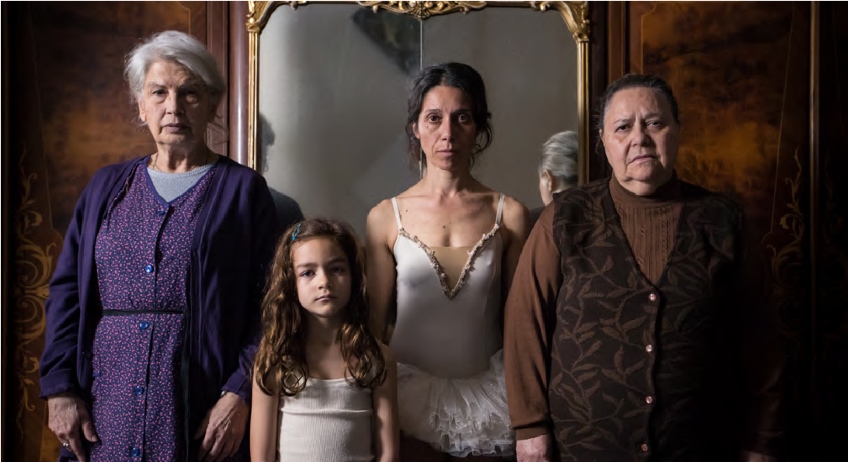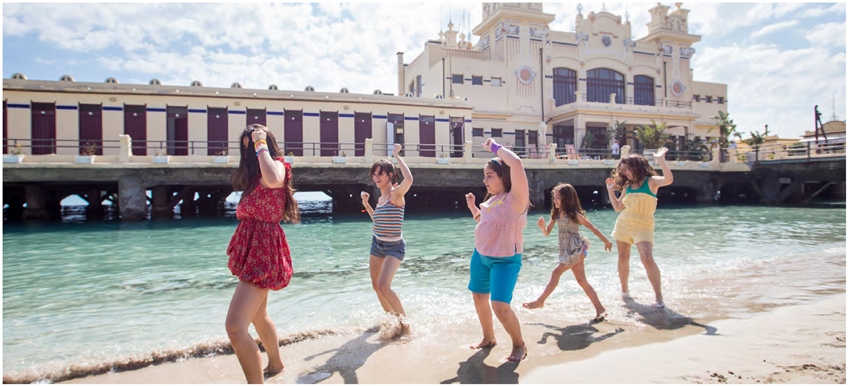The Macaluso Sisters (December 18, 2020) Curzon Home Cinema
Though based on her play about the effects of a tragic death on five orphaned sisters from Palermo, Emma Dante’s film feels dreamlike, painterly and cinematic, at times, experimentally so. Only the three-act structure, the last two acts taking place almost entirely in the family apartment, is a giveaway. The long first segment looks like a sun-drenched painting by the Spanish seaside and painter Serolla who had young, beach-loving daughters himself. The strongest act of the three, act one haunts you throughout the rest of the film, and that’s the point. A tragic event hangs over the lives of the sisters, too, until it becomes a kind of forlorn ghost story.
It is the 1980s, a summer’s day in a depressed district of Palermo, although the pervasive sea and blue sky somewhat mitigate this impression. In a spacious, if dilapidated top-floor apartment in a bland, concrete building, the five Macaluso sisters, ranging from about 5 to 20 are a flurry of bare limbs and long hair, different heights and shapes running around in underwear, giggling, chatting, bickering and quickly dressing when the doorbell rings. In the characters’ physicality, you might be reminded of the Turkish film Mustang, another film about five close-knit, spirited sisters living next to the sea. That is where the comparisons stop however as that was a coming-of-age movie about religious oppression in a strict Muslim community.
Amid the chaos we gather that a regular customer is coming to collect the homing pigeons that the girls keep and hire out for weddings and similar celebrations. In the second act, when sister Katia (Laura Giordani) is married with a son her husband, complains about the pigeons that wander from the dovecote into the living quarters. He is eager to get his hands on Katia’s share of the flat, but her unmarried sisters still live there. Katia explains that the pigeons were their livelihood. We never learn the circumstances that left these young women alone in this apartment with the pigeons.

On this sweltering day, the girls are eager to head for Mondello Beach, a long, atmospheric walk along a canal (at one point they walk through a miniature Crystal Palace dinosaur park) and then a bus ride, during which we observe the dynamics of the family. Attractive, lanky, energetic Maria (Eleanora De Luca) dances rather than walks, although in several scenes in the film she pauses to read to the annoying, argumentative, middle sister Lia (Usanna Piraino), to pacify her with literature. Lia might have been a literature student if university were an option, and if the course of that summer day had been different. The next sister is chubby, mellow Katia (Alissa Maria Orlando) several years older than the darling of the family, five or six-year-old Antonella (Viola Pusateri).
Dante has shown us some of these sisterly relationships earlier, most memorably, when Pinuccia (Anita Pomario), boy-crazy and obsessed with her appearance, is getting dolled up in the bathroom. Adorable Antonella with long chestnut hair and beautiful features, watches her elder sister adoringly, until Pinuccia puts some of her lipstick on her delighted sibling. After the dressing and squabbling the sisters march out of the building and their high spirits are contagious. We are with them, feeling the heat, the joy of a day out together, and anticipating the cool water.
By the time the sisters arrive at Mondello Beach and sneak in to avoid paying, we know them, and if they are not all as sympathetic as the sisters in Mustang, they are a real, believable family, each with her unique personality.
Once an exclusive resort, Mondello Beach is now downmarket, but all the sisters’ friends are there as though waiting for them. Maria begins splashing in the water, before leading a dance through the shallows like the Pied Piper of Mondello. Then the sisters split up. Maria wanders off to seek out a pretty friend who is putting out flyers on the seat of an outdoor cinema. The two young women flirt and then kiss tenderly. Encouraged by the kiss, Maria confides in her girlfriend that she is going to become a professional dancer.
Meanwhile, the other sisters are swimming under the bridge to begin their raid on the Charleston, a once elegant art-nouveau restaurant overlooking the water. Impatient when Lia, with Katia standing by, encourages little Antonella to climb up the ladder to the terrace, Pinuccia swims away, as energetic a swimmer as Maria is a dancer.

It is here when we cut to the second act, when the sisters are adults, only now there are four. The scene at the Charleston is replayed throughout the film until, at the end, it is played out in full. A new set of actresses, as good as the young ones, play the sisters now. Katia (now played by Laura Giordani) is fat and unromantically married, pleased to get away from her husband to be with her sisters. Lia (Serena Barone) is unattractive and mentally ill. Pinuccia (Donatella Finocchiaro) has a boyfriend and taunts the virginal Lia forcing her to wait outside the apartment and listen to their lovemaking. If Pinuccia is cruel with Lia, and Lia particularly bitter, it might be because both share the guilt from that summer’s day long ago.
But Dante seems most focused on Maria (now played by Simona Malato), who did not fulfil her dream to be a dancer. In contrast, we see her pulling the organs out of dead animals as a lowly paid vet’s assistant. She is prematurely haggard and painfully thin, but while her sisters, who have congregated for her birthday, begin the feast that they have prepared, Maria lies in the bathtub preoccupied. She has an announcement, and it is not good news.
Another set of actresses represent the sisters, or the three that remain, at the end of their lives. This act, and to some extent act two, might be confusing as Dante has not gone for lookalikes, but personality types and she skips a couple of decades with, thankfully, no filler captions.
What emerges, though, is a tale of grief so viscerally and sensitively realised that we are still with the sisters at the end, thinking back to that summer day that began with so much promise and wondering “what if”. And what also emerges is a bold film adaptation, not only in terms of the complex casting, but the various techniques that Dante and cinematographer Gherardo Gossi employ to convey the lonely passing of time.
You can read our review of Mustang by clicking here.




